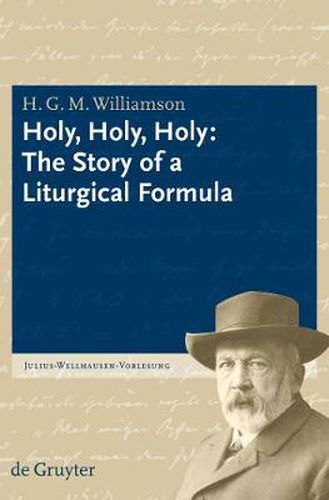Readings Newsletter
Become a Readings Member to make your shopping experience even easier.
Sign in or sign up for free!
You’re not far away from qualifying for FREE standard shipping within Australia
You’ve qualified for FREE standard shipping within Australia
The cart is loading…






In one form or another, the Trisagion, Holy, holy, holy is the Lord of hosts; the whole earth is full of his glory , entered Jewish and Christian liturgy at an early stage from Isaiah’s account of his vision as recorded in Isaiah 6. Before that happened, however, it is likely that it went through a significant change of meaning from what the Old Testament prophet himself meant by it. Drawing on material that was familiar to him from the worship of the Jerusalem temple, he used it distinctly but characteristically to challenge his audience’s view that God would automatically protect them from their enemies. In other words, the saying had a threatening rather than an encouraging tone. In the course of the following centuries, however, as the book of Isaiah grew, new reflections on the saying were added in the later chapters, with the result that when the book came to be translated into Greek the translator was justified in rendering the saying in the way that has become familiar to us. The unusual retention of the Hebrew word Sabaoth , however, reminds us even today of the long path by which it has reached us from antiquity.
$9.00 standard shipping within Australia
FREE standard shipping within Australia for orders over $100.00
Express & International shipping calculated at checkout
In one form or another, the Trisagion, Holy, holy, holy is the Lord of hosts; the whole earth is full of his glory , entered Jewish and Christian liturgy at an early stage from Isaiah’s account of his vision as recorded in Isaiah 6. Before that happened, however, it is likely that it went through a significant change of meaning from what the Old Testament prophet himself meant by it. Drawing on material that was familiar to him from the worship of the Jerusalem temple, he used it distinctly but characteristically to challenge his audience’s view that God would automatically protect them from their enemies. In other words, the saying had a threatening rather than an encouraging tone. In the course of the following centuries, however, as the book of Isaiah grew, new reflections on the saying were added in the later chapters, with the result that when the book came to be translated into Greek the translator was justified in rendering the saying in the way that has become familiar to us. The unusual retention of the Hebrew word Sabaoth , however, reminds us even today of the long path by which it has reached us from antiquity.